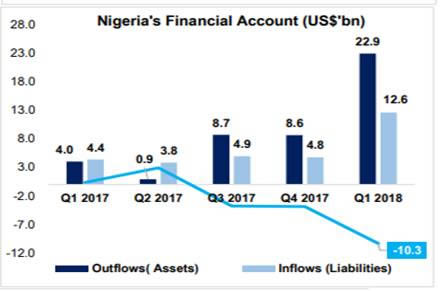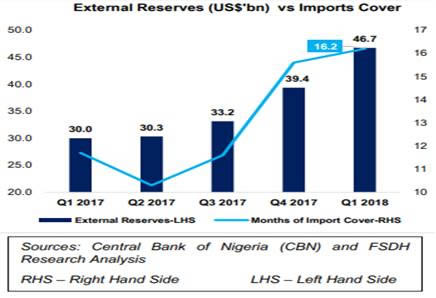Monday, July 16, 2018 / 2:00PM / FSDH Research
FSDH Research’s analysis of Nigeria’s Balance ofPayments (BOP) position as at Q1 2018 confirms our view that the country’sexternal position remains strong but vulnerable to developments in the crudeoil and gas market. The provisional BOP figures for Q1 2018 published by theCentral Bank of Nigeria (CBN), indicates that the overall BOP for Nigeria showsa surplus of US$7.32bn in Q1 2018, an increase from a surplus of US$2.98bn inQ1 2017.
The overall BOP as a percentage of Gross DomesticProduct (GDP) grew to 7.85% in Q1 2018 from 3.49% in Q1 2017. A strong BOPhelps to sustain stability in the foreign exchange market and reduce exchangerate risk. Our analysis of the current account component of the BOP shows thatit increased to a surplus of US$4.47bn in Q1 2018 from a surplus of US$3.42bnin Q1 2017.
Total inflows (consisting of exports and net currenttransfers) increased by 40.10% to US$20.83bn in Q1 2018 compared withUS$14.87bn in Q1 2017. Nigeria’s inflows were dominated by crude oil and gasexports, accounting for 93.28% of total exports and 64.46% of total inflows.Outflows were dominated by the non-oil imports and net payments for services.

Thefinancial account closed the quarter at a net outflow of US$10.29bn from a netinflow of US$355.88mn in Q1 2017. Inflows into the financial account weredominated by other investments and portfolio investments, accounting for 52.73%and 40.85% of total inflows respectively.

TheBOP report shows that the external reserves as at Q1 2018 stood at US$46.73bncompared with US$30bn in Q1 2017. The reserves as at Q1 2018 could financeapproximately 16.2 months of imports higher than the global and West AfricanMonetary Zone benchmarks of 3 months and 6 months respectively. FSDH Researchnotes that the Nigerian economy is overly dependent on crude oil, whichpresents a significant downside risk.
Governmentat all levels must intensify efforts to implement policies that would grow thenon-oil sectors of the economy. This would ensure that the economy is mitigatedagainst consequences attached to adverse developments in the crude oil marketand would also encourage more foreign capital inflows in the form of ForeignDirect Investments and Foreign Portfolio Investments.

Related News
1. Weekly Economicand Financial Commentary – WE 13th July 2018
2. Expected Drop inInflation Rate and Yields Movement
3. Public DebtVulnerable to Exchange Rate Movements
4. Domestic Economy- Lingering Negative Output Gaps
5. Nigeria’s TradeStatistics – Oil Dependence Persists
6. Investment inHuman Capital Remains Key to Unlocking Nigeria’s Economy
7. No Respite AsPrice Pressure Persists - Pentad
8. From Russia withTears and the New Economic Disorder - LBS EBS – July 2018
9. Inflation Rateto Moderate Lower in June
10. June 2018Economic Update: Economics Vs Politics
11. Nigeria PMI-Slightly Brisker Economic Expansion in June
12. Year-On-YearInflation Set To Fall Again To 11.1% but Monthly Inflation to Spike
13. Nigeria’s HugePopulation: Beneficial?
14. Finance MinistryQuestions NNPC Remittances To Government, Again
15. BOP SurplusIncreased by 18.47% to US$7.32bn in Q1 2018
16. ManufacturingPMI Stands at 57.0% in June 2018 from 56.5% in May 2018
 Lagos, NG • GMT +1
Lagos, NG • GMT +1











 5149 views
5149 views






 Sponsored Ad
Sponsored Ad
 Advertise with Us
Advertise with Us









